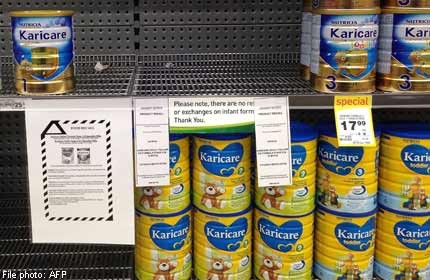'100 per cent Pure' NZ takes big knock to credibility

WELLINGTON - For a country that markets itself using the slogan "100 per cent Pure", New Zealand's environmental credentials are not as impeccable as many might think.
The majority of its rivers are too polluted to swim in. Its record of preserving natural environments is among the worst in the world on a per-capita basis.
Dairy giant Fonterra's discovery of bacteria that can cause potentially fatal food poisoning in ingredients sold to eight countries exposes the fragility of New Zealand's clean and green image.
"It was only a matter of time before our dirty little secret came out," said Ms Jill Brinsdon, brand strategist at Radiation, a brand agency in Auckland.
"Fonterra is our largest exporter, it's completely intertwined with New Zealand's image and it's the absolute biggest benefactor of the '100 per cent Pure' brand.
"When you're coming out with something that presents itself as fact, or 100 per cent pure, then you have to be 100 per cent pure, and we've proven that we're not."
New Zealand's primary sector, which includes fishing and forestry, accounts for some 60 per cent of exports and 18 per cent of the country's US$160-billion (S$203-billion) gross domestic product. Tourism makes up about another 10 per cent of GDP.
The country has touted itself as "100 per cent Pure" in print and TV ads, drawing millions of visitors each year to experience its national parks, beaches and lakes.
But the marketing overlooks a dark side to the country's environmental credentials.
More than 60 per cent of New Zealand rivers monitored by the Environment Ministry had "poor" or "very poor" water quality, and were rated as unsafe for swimming due to pollution.
Dairy farming - which has a lot riding on New Zealand's strong environmental reputation - has been a significant cause of poor river quality, due to fertiliser and effluent run-off.
"Because we've had a lack of regulation on farm waste for 20 years, it's been a free-for-all, so farmers have done what they can to produce more milk - which is to put more cows on pastures," said Dr Mike Joy, an ecology and environmental-sustainability scientist at Massey University.
Prime Minister John Key said New Zealand would always be reliant on dairying, due to the country's natural competitive advantage amid rising global demand.
"The right answer is not for New Zealand to sell less dairy. The right answer is for New Zealand to be absolutely sure that safety standards are met," he said yesterday.
The country's food-safety record isn't impeccable.
Until the late 2000s, New Zealand had the highest rate in the developed world of foodborne campylobacteriosis, a sometimes-deadly disease caused by bacteria often found in uncooked chicken.
As of 2011, New Zealand still reported incidents of the disease at more than double the rate of nearby Australia and 12 times the rate of the United States, according to the University of Otago.
The botulism scare at Fonterra was the company's second contamination issue this year; it earlier found traces of dicyandiamde, a potentially toxic chemical, in some products.
Even so, the country has one of the most stringent food-safety regimes in the world, and the recent dairy-product scares only turned up thanks to the sophisticated and sensitive testing available.
Fonterra expects the current contamination issue to be resolved within days.
A protracted, major animal-health incident, rather than a localised contamination issue, could wreak havoc on the New Zealand economy.
Still, "we've got to wake up and look more closely at our green credentials, and work harder to create a pristine environment so consumers can get a product which matches the story", said a consultant to New Zealand companies operating in Asia.